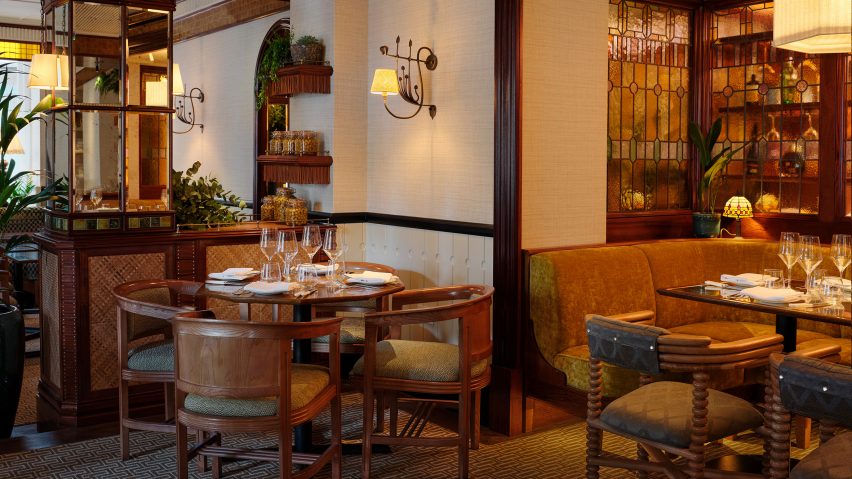London design studio Pirajean Lees referenced Mayfair's pastoral past and created a series of spaces that nod to the idea of a Georgian manor house when designing restaurant 20 Berkeley.
Pirajean Lees aimed to build a story around the space and its sequence of many small rooms, while tapping into the restaurant's British produce-led culinary approach.
"The restaurant is situated in the heart of Mayfair, a place once on the cusp of the city and countryside," Pirajean Lees told Dezeen.
"The farming history of the area and its connection to the surrounding rural lands is prevalent throughout the project and paramount to the dining experience."
Pirajean Lees wanted to put nature and craft at the heart of this design project to align it with the ethos of Creative Restaurant Group, the restaurant's founders.
"This led us to build on the strong connection of an imagined Mayfair Georgian manor house and its rural lands, which would have been used to grow produce," the studio said.
"A central staircase leads to rooms usually found in a traditional family home, such as the drawing room, music room, pantry, orangery and salon. Each room has its own character whilst belonging to the one property."
On the upper-ground floor are the richly designed reception and main dining rooms.
The lower-ground level houses a 14-seat private room with its own exclusive lounge and dining area, alongside the kitchen, wine cellar and main bar, The Nipperkin.
The design of the interiors references the arts and crafts movement of the late 19th and early 20th centuries.
"At 20 Berkeley, we have developed a layered story of handmade details and tactile finishes that exude elegance," said Pirajean Lees.
"The project's expression is rooted in the traditions of craftsmanship and how the process of making decorative objects and furniture should showcase the beauty of both its materials and construction."
The resulting aesthetic is detailed, with a palette of rich, warm tones including ambers, ochres and dark reds, used across upholstery and textural wallcoverings. Floor tiles have been hand-crafted in Wales and feature clay embedded with fossils.
Bespoke joinery work was utilised throughout the space, including for the wall panelling, dowelled ceilings and an English oak staircase.
The project also features bespoke elements that were added to bring a sense of opulence to the various spaces.
These include a pantry, in painted timber, that provides a strong focal point of the upper floor. Here, chefs prepare dishes on the pantry island, "inviting guests to witness the chefs' craft, as one would do in one's home, whilst hosting guests for dinner," said Pirajean Lees.
In the orangery, a bespoke pickling cupboard, made from sapele wood and marble, serves as "a pleasing curiosity", used by the chefs to store jars of vegetables for their recipes.
The bespoke dining tables and chairs were made of oak, while the chairs have been traditionally upholstered for maximum comfort.
"The bespoke and craft elements bring depth to the project, anchoring it in its strong narrative and creating timeless interiors," said Pirajean Lees.
Bespoke stained glass, handcrafted in a North London studio, is another of the restaurant's features.
Used in the reception and drawing room, the stained glass has been strategically positioned, backing onto the busy central bar to give a sense of movement and energy.
In front of the windows, it warms the light coming into the rooms to create an immersive atmosphere.
"The stained glass introduces shadows and reflections, which change throughout the day and are different in each room," said Pirajean Lees.
"As per each of our projects, the tailored finishes, joinery and surfaces here, have been carefully created to ensure optimum use of the space by the restaurateur and their guests."
Other hospitality projects from the studio include an ornate sushi restaurant in Dubai with interiors informed by 1920s Japan and a members club in London, housed inside the iconic music venue Koko.
The photography is by Polly Tootal.

